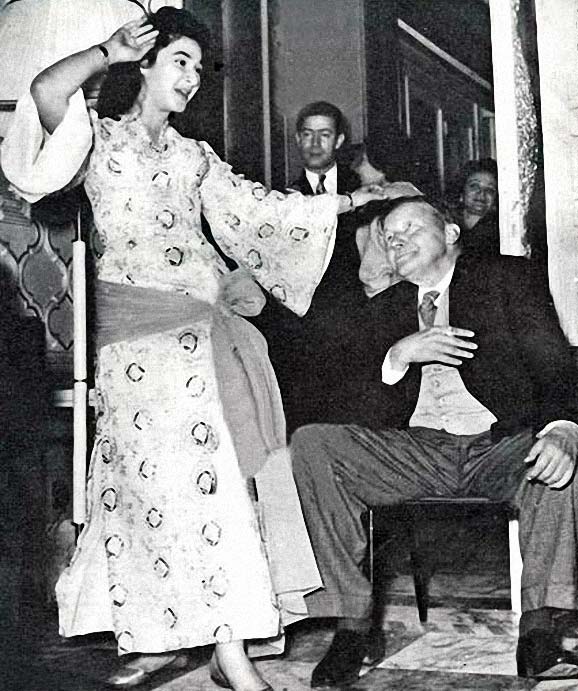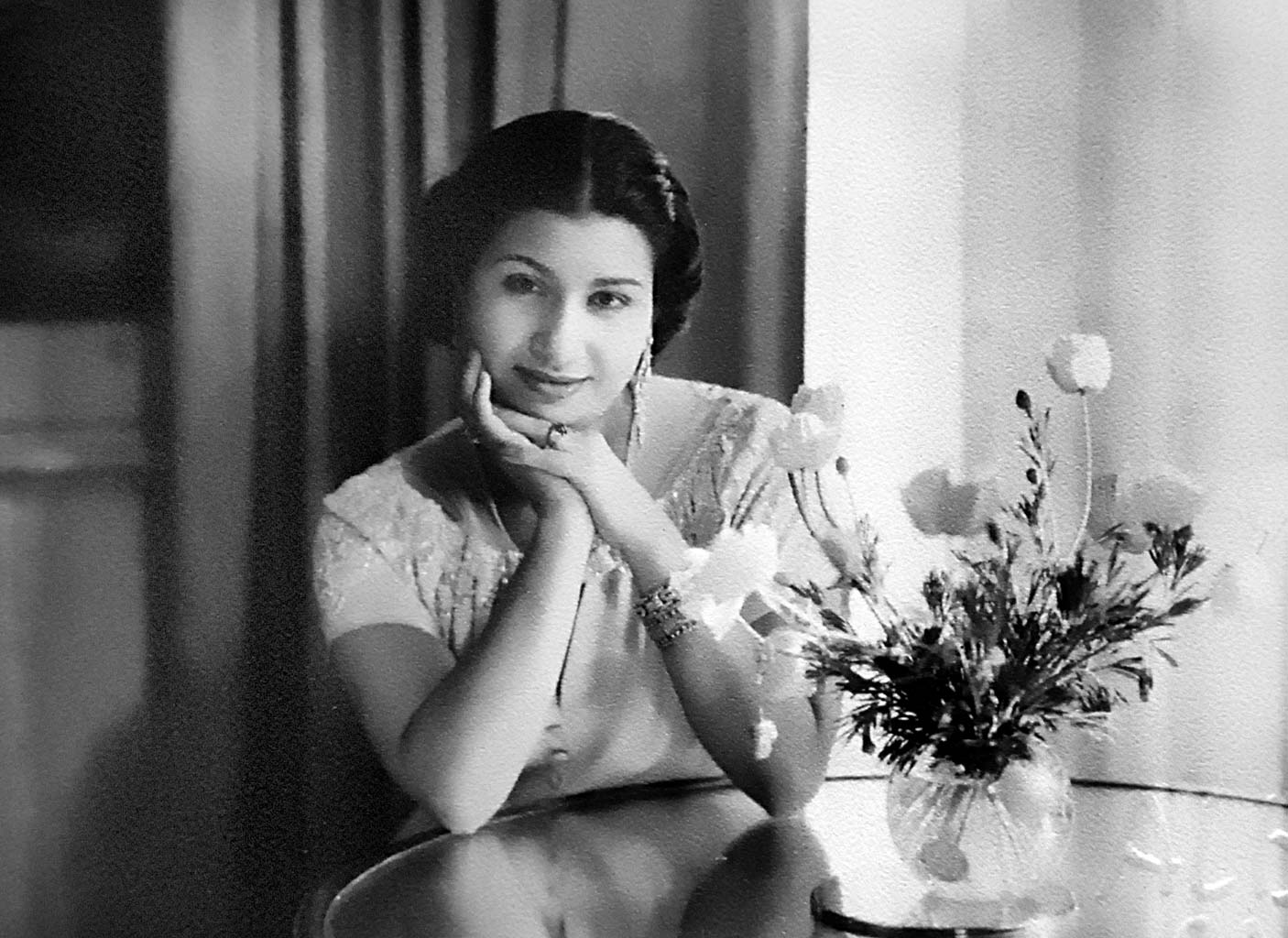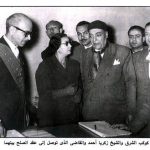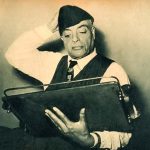Mustafa Said: Dear friends, welcome to a new episode of these special episodes which we present in memory of Sheikh Zakariyya Ahmed’s 60th death anniversary with the great historian Frederique Lagrange. Today’s episode will continue dealing with the trio that filled the world with their art, i.e., Bayram, Zakariyya and Om-Kolthoum.

Bayram
M: Cinema, Om-Kolthoum and Cinema: it’s said that in the movie wherein Bayram and Zakariyya took part in its making, Om-Kolthoum was a good actress as she was doing unusual movements for Om-Kolthoum. Even the songs in this movie, despite having been typically in the Maqam Music Tradition, were very light and cheerful. Usually recitatives, arias and fox-like rhythms were used to express joy and cheerfulness, Bayram and Sheikh Zakariyya, however, could achieve more joyful atmosphere than what used to be got in this period.
F: Do you mean Sallama?
M: Yes.
F: It’s good that you could understand what you meant. And you probably mean {starts humming} Salamu’l-lah.
M: and many others too.
[Listen to Salamu’l-lah and Ane’l-Ushshak.]F: In the songs of the historical movies, I’m rather disturbed by the fabricated language. I don’t like the language in which one speaks pure Cairo dialect and turns the Q sound into G sound and refers to this as a Bedouin dialect. The Bedouin dialect isn’t like that at all, it’s Cairo dialect with G sound.
F: it’s not even Lower Egyptian or Upper Egyptian.
F: no, it’s a completely faked language for the cinema and it disturbs me very much because, it’s not only historically incorrect, but it’s a kind of trick. Let’s better skip this point.

Om-Kolthoum
M: It’s only a change of the norm.
F: I agree with you.
F: I believe there’re a couple of songs from Sallama that Om-Kolthoum decided to sing in a concert: Ya Ain Ya Ain Ya Ain
M: and Ghanni-li Shwayy Shwayy.
F: I don’t think that Ghanni-li Shwayy Shwayy was suitable to be sung in a concert as the text of the lyrics is very linked to the movie itself, E.G., “Ahlif lak berabbe’l-Beit”. I wonder why she have chosen to sing this line specially in public.
M: I’ve a theory: the famous Rast entry of the song {he hums it} seems to have been a folkloric tune played with Arghoul and Sullamiyya. Time and time again, we hear it in the old records of Mohammed El-Arabi, Sabha El-Mansuriyya and Zainab El-Mansuriyya, in the 1920’s and before…
F: and Mohammed El-Soghayyar.
M: Yes, we’ll find that this theme, call it a Dulab or an entry, was there in the folkloric tradition.
[Listen to the main theme of Ghanni-li Shwayy Shwayy played in the folkloric style.].M: Sheikh Zakariyya took this instrumental theme, added lyrics to it, and then built this very beautiful song whose refrain remained in people’s minds surely.
F: Ghanni-li Shwayy Shwayy is the song that Om-Kolthoum chose to sing in the honorary concert organized in Nadi Al-Musiqa Al-Sharqiyya upon her return from her treatment journey to the USA.
[Listen to Ghanni-li Shwayy Shwayy from the above-mentioned concert.].F: Unfortunately, the recording isn’t clear, and this is one of the very rare cases, maybe I’m wrong, that she is out of tone in the beginning. There’s a possibility that the recording speed isn’t very just and this gives this impression.
M: Yes, the speed isn’t very correct.
F: but, in the very beginning she got slightly out of tone. One feels that she had no sufficient self-confidence as she’d just returned home and probably she was not yet sure whether or not her voice was affected by the treatment, radiation and by all that happened to her in America. I think, then, that the normal concert was much better.
[Listen to part of the same song from a normal concert.].F: The other song Ya Ain Ya Ain Ya Ain was not one of the songs expected to be chosen by her. There were other songs in Om-Kolthoum’s movies composed by Sheikh Zakariyya that I wished to have heard in concerts. Gamal El-Dunya has a very difficult structure, moving from a sentence to another was very difficult and needed a lot of concentration. Despite being a mere Taqtouqa, it’s not easy at all, and it’s very well composed. By the way, I prefer the movie version to the disc version. The movie version is much better.
M: shorter but much better, faster and lighter.
F: It’s faster and lighter, and, as always with Zakariyya Ahmed, he deals with the whole voice of Om-Kolthoum. He makes her sing from high notes from the very beginning.
[Listen to Gamal El-Dunya by Om-Kolthoum.].F: Also, from the movie Aida we listen to her in one of the songs Ya Farhet El-Ahbab. Ya Farhet El-Ahbab is first, despite the difference of the Maqam,
M: and regardless of the fact that it starts with the voice of Mary Muneeb.
F: [Laughing loudly] Yes, regardless of Mary Muneeb, and regardless of anything else, this song is in Segah
M: and the other was Shuri.
F: and Gamal El-Dunya is shuri, nonetheless, there’s a structural similarity. Also on the rhythmic level, there’s a very special thing in Ya Farhet El-Ahbab.
M: She sings in Darig [A rhythm name] and the rhythm is in fast Wahda [Another rhythm name] like Maqsoum, and that was intentional. It’s clear that she’s singing in Darig and the main rhythm is fast. Probably he wanted to make a festive atmosphere and keeps the Darig at the same time. It’s very clear from the meter of her singing “Mustafilun Faelatun” [Arabic Arud metric units] that it was divided on a Darig style. The main rhythm and the singing meet every 12 beats and sometimes, simultaneously, the main beat comes to the 7th beat so it turns into 4,2,2,4 which are also the 3 Maqsoum bars with which a couple of Darig bars meet. A very beautiful musical action which is clearly intended. It dominates the whole song but it’s very well made.
[Listen to Ya Farhet El-Ahbab.].F: Note that only in the movies that Sheikh Zakariyya composed the music for a literary poem.
M: True, only in movies that he composed for literary poems for Om-Kolthoum.
F: He didn’t compose many songs.
M: Yet, he composed many Tawasheeh. [A tawsheeh is a religious poem written in classical Arabic or Fusha]. But, very little poems, probably Adha Al-Tana’i.
F: Adha Al-Tana’i of Fathiyya?! Is it really his?
M: Yes.
F: But, not his style at all. I do not feel his style.
M: What to do?!!
F: OK, though I don’t feel!!!
M: Let’s get back to the poem which he composed for her in the movie.
F: It’s not a Qasida on the Wahda rhythm, but text wise, the lines are very similar and the only difference is in the rhyme. “Quli letayfiki yensani An Madja’i waqta’r-ruqad”, so, we’ll find Ruqad, Fouad and Me’ad, and then he same lines are repeated except for the endings, so instead of Ruqad, there’s Wujuu’, and instead of Fouad, there’s Dolouu’, and in the third section we’ll have Malam and Izam respectively. The final word only changes, yet the lines are the same. Even as a poetic form, it’s a poem but doesn’t follow the standard poem shape. This is a very rare occurrence in Arabic poetry which Om-Kolthoum recorded as a composition by Sheikh Zakariyya Ahmed. You may not agree with me, but I always feel that there’s this fun dimension about which I talked earlier. Bayram, Zakariyya and Om-Kolthoum when they’re together they like to play (The original poem is by El-Shareef El-Radi). This is a joke: we take the same text but change the final word of each line. Sheikh Zakariyya, then, had to think about a similar joke which is to change the Maqam. So, the first part would be in Segah, then in Bayyati and finally in Saba to make a different atmosphere, i.e., in Izam and Siqam which will be in Maqam Saba.
M: the weeping mood must come up!!!
F: exactly. They played with the listener in one of the best of what Om-Kolthoum sang. And, by the way, this is one of the songs that could have been sung in concerts.
M: True.
F: yet, unfortunately, she chose otherwise. But, I was really wishing to have heard Quli Letayfiki Yansani in a concert. We may also conclude this episode about the partnership between Om-Kolthoum and Sheikh Zakariyya Ahmed with a lamentation for the lost things. It’s a real mystery for me. This mystery can be summarised in the carelessness of the big artists as regards their heritage. They concentrate on a very small portion of this heritage when they feel that it’s lost. I always wonder some of their perplexed choices when they feel that something is lost. For instance, when they told Om-Kolthoum in 1955 that her song Ya Tool Azabi was lost. Ya Tool Azabi was not recorded on a disc. In 1955, she recorded Ya Tool Azabi and then, they found an old recording of the song, that was very beautiful commercial recording which contained improvisation and everything. But I don’t understand how she ignored the lost items of Sheikh Zakariyya Ahmed specially the long songs i.e., Koll El-Ahibba Etnein Etnein. Why were these songs lost forever and why hasn’t she thought about re-recording them in the 1950’s? This may be because of the disagreement with Sheikh Zakariyya. But, even though, I can still sense a kind of apathy: “Ok, people have already heard them”…etc.
M: But, it may also be because of her voice?
F: I agree with you in this. Ya Tool Azabi was easier to re-record in the 1950’s without improvisation, but Sheikh Zakariyya’s songs without improvisation would have been 5 minutes maximum. This may have been also one of the reasons why she did not re-record them and so, they were lost forever. So, let’s recite a Fatiha to Om-Kolthoum and to Sheikh Zakariyya ya Seedi.
M: and to Bayram as well. The very beautiful trio. After this lamentation, let’s listen to Al-Shereef Al-Radi’s poem to which we wished to have a concert version, but sadly we’ve only the movie version. Until we meet again, we’d like to thank Frederique afandi…. No, no, his highness Frederique Lagrange Pasha.
[Listen to Quli Le-tayfiki Yansani from Om-Kolthoum.].The end.
- 221 – Zakariyya Ahmed – 12 (1/9/2022)
- 220 – Zakariyya Ahmed – 11 (1/9/2022)
- 219 – Zakariyya Ahmed – 10 (11/25/2021)
- 218 – Zakariyya Ahmed – 9 (10/26/2021)
- 217 – Zakariyya Ahmed – 8 (9/24/2021)
- 216 – Zakariyya Ahmed – 7 (9/4/2021)
- 215 – Zakariyya Ahmed – 6 (8/28/2021)
- 214 – Zakariyya Ahmed – 5 (8/6/2021)
- 213 – Zakariyya Ahmed – 4 (6/26/2021)
- 212 – Zakariyya Ahmed – 3 (5/27/2021)
- 211 – Zakariyya Ahmed – 2 (5/1/2021)
- 210 – Zakariyya Ahmed – 1 (4/28/2021)
- 209 – W-al-Lāhi lā astaṭī‘u ṣaddak 2 (4/6/2017)
- 208 – W-al-Lāhi lā astaṭī‘u ṣaddak 1 (3/30/2017)
- 207 – Bashraf qarah baṭāq 7 (3/23/2017)


